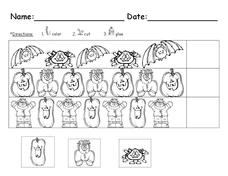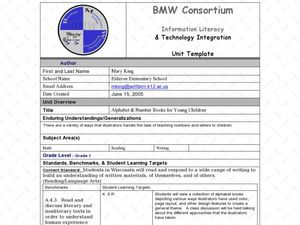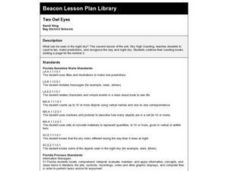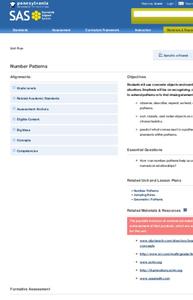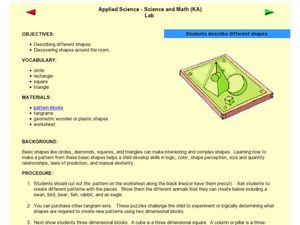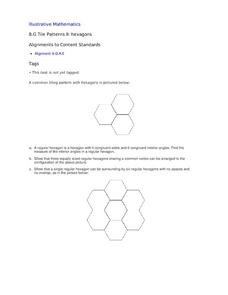Curated OER
Building Patterns Incrementally
Students study the recurrence rules for patterns where the increase from one term to the next is not constant. They look for the recurrence rule on their own. They copy the pattern and create the next element, continue the pattern with...
Curated OER
Halloween Patterns
In this Halloween worksheet, students study the three sets of Halloween patterns. Students then color, cut, and glue the three images to their correct pattern.
Curated OER
Pattern Equations
In this multiplication worksheet, students study the four equations that equal like numbers. Students then make up their own patterns for the four equations listed. Students must solve the last two equations.
Curated OER
How Many Ways Can You Represent a Number?
Students participate in monthly scaffolded lessons that focus on working with whole numbers from 1 to 10. They work with tiles on exploration mats, number tile mats, and a number representation book. Each month they complete activities...
Curated OER
Alphabet & Number Books for Young Children
First graders create either an alphabet or number book using Kid Pix software. In this alphabet and/or number unit, 1st graders design a themed alphabet and/or number book using the Kid Pix software over the course of three weeks....
Curated OER
Two Owl Eyes
First graders listen to the story, Olivia Counts, and demonstrate counting to ten. They make predictions, and recognize the day and night sky. They add page number 2 to their counting books.
Curated OER
Learning about Fibonacci
In this learning about Fibonacci worksheet, students read about Leonardo Fibonacci and his contribution to mathematics, then study the pattern of Fibonacci numbers, in math and in nature.
Curated OER
Paper Folding to Make Cubes
Examine patterns of figures composed of six-squares and predict which of the twenty presented could be folded to make a cube. They then fold large-scale patterns of these figures to confirm their hunches.
Curated OER
Starfish Surprises
In this missing numbers worksheet, students write the missing numbers covered by the starfish in the patterns. Students complete 6 problems total.
Curated OER
Pascal's Triangle
Students explore the concept of Pascal's Triangle. In this Pascal's Triangle lesson, students use an applet called 'Coloring Multiples' to explore Pascal's Triangle. Students develop patterns starting with various numbers in Pascal's...
Curated OER
Divisibility Tests
It's not a short cut, just good old fashion number sense, but kids will love it. This presentation does a wonderful job describing the divisibility rules by showing how each one works, reviewing the rules as a collective and providing an...
Curated OER
Graphing Ordered Pairs
Here is graphing worksheet which has pupils graph ordered pairs and label the axis. They graph five ordered pairs and then interpret the data in the graph.
Curated OER
Number Patterns
First graders use manipulatives to complete and extend patterns. In this patterns lesson, 1st graders complete a pattern with a missing element, extend a pattern, and sort objects by characteristics.
Curated OER
Number Patterns
Students discover patterns in sets of whole numbers using calculators. They write journal entries and orally report their findings to the class. They look for primes, squares, cubes and multiples.
Alabama Learning Exchange
Mix it Up! Exploring the Commutative and Associative Properties of Addition
Examine commutative and associative properties with your class. They'll explore the relationships between addition and subtraction and investigate patterns as they solve addition problems. Links to an assessment and a table game are...
Curated OER
Telling Time as an Everyday Use of Numbers
How can we estimate time? Have your young mathematicians make a clock. Then they compare and contrast types of clocks. They practice writing times in two different ways and make a book about telling time.
Curated OER
Applied Science - Science and Math (K) Lab
In this shape lesson, learners cut out tangram shapes and create different pictures with them. They look at 3-D shapes as well. There is a nice, hands-on component built into this lesson.
Curated OER
Tile Patterns II: Hexagons
After learning that the sum of interior angles for triangles is 108 degrees, take it further to show that the sum of angles in any polygon is the same! Using hexagons, pupils practice finding the measure of the six congruent angles. Make...
Curated OER
Math, Fractions, and Music
Students discover the relationship between musical rhythms and fractions. They add musical notes together to produce fractions and create addition and subtraction problems with musical notes. Students complete worksheets and create their...
Alabama Learning Exchange
Bloodstain Pattern Doesn't Lie......
An interesting instructional activity on hypothesizing about the diameter of a drop of blood that is splattered. To test their theories, learners work in groups to make blood droplets splatter from different heights. They use graphed...
Learing A-Z
Color Your World
Do your pupils know all the colors of autumn leaves? This packet of autumn-themed materials will help your kids fall right into knowledge of colors. Pupils practice making patterns, identifying and writing color words, coloring and...
Noyce Foundation
Granny’s Balloon Trip
Take flight with a fun activity focused on graphing data on a coordinate plane. As learners study the data for Granny's hot-air balloon trip, including the time of day and the distance of the balloon from the ground, they practice...
CK-12 Foundation
Sum and Difference of Cubes: Stacking Blocks
Investigate polynomial factoring patterns by finding a connection to volume. As learners build a three-dimensional solid from smaller solids, they convert the visual model to a mathematical expression. Their models represent the sum of...
Inside Mathematics
Squares and Circles
It's all about lines when going around. Pupils graph the relationship between the length of a side of a square and its perimeter. Class members explain the origin in context of the side length and perimeter. They compare the graph to the...



